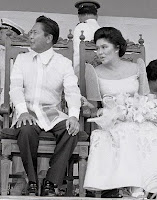The fatal role of the Media in the hostage massacre: Public perception is the judge
 An end in itself. This is how Radio Mindanao Network anchor Jake Maderazo described the reporter's "job" of, well, "reporting". Apparently this "job" comes first in any situation, even situations that endanger human lives. Pressed by Filipino-Chinese community representative Teresita Ang-See with the rhetorical statement "No profession should ever be more important than (saving) human lives and more important than showing what was happening inside (the bus)" to highlight the fatal role the Media played in the botched handling of the Mendoza hostage crisis, Maderazo only had this to say...
An end in itself. This is how Radio Mindanao Network anchor Jake Maderazo described the reporter's "job" of, well, "reporting". Apparently this "job" comes first in any situation, even situations that endanger human lives. Pressed by Filipino-Chinese community representative Teresita Ang-See with the rhetorical statement "No profession should ever be more important than (saving) human lives and more important than showing what was happening inside (the bus)" to highlight the fatal role the Media played in the botched handling of the Mendoza hostage crisis, Maderazo only had this to say..."That's true, but it's not our fault. We just did our job to report," [...]
Too bad, Jake. Most people now beg to differ.
The days of Media self-adulation as "heroes" of the "people's" right to information are over. Regardless of any "debate" around whether the death of eight Chinese foreign tourists is Media's fault or not is no longer relevant.
Public perception is the judge and jury today.
It is ironic that an industry that derived its power from a monopolistic control over public perception now finds itself stared down by the very perception it once played a key role in whipping up at its convenience.




we don't need to know everything which means that their obsolete duty sucks
ReplyDeleteNassim Taleb in his book Black Swan observes that being constantly updated on the minutiae of the moment does not necessarily make one wiser or more insightful. Wisdom comes from the ability to step back, regard the bigger picture, and connect the dots.
ReplyDeleteUnfortunately for us, the advent of the constant chatter of 24/7 coverage, 140-character twitter feeds, and other noise keeps us narrowly focused on the trivial rather than on acquiring the LOST skill of regardling the full landscape, identifying important and relevant information, and piecing together a coherent big picture.
Yes, media can cover it in order to get the facts right. But it doesn't have to broadcast it while lives are in danger. There is such a thing as a media embargo if important events will be pre-empted by a premature disclosure. Print journalism follows this standard procedure when requested by companies or organizations who issue press releases.
ReplyDeleteWhy can't the broadcast media now follow this same tried-and-true journalistic practice? In warfare, the Allied forces (USA, UK, etc.) often embedded journalists into their operations but requested them not to release the information until such a time when the operations or soldiers won't be placed at risk by premature disclosures.
Why can't the Philippine Media or certain member of it hold themselves to this standard practice? If they can't abide with it, why can't other media outfits publish or speak out their outrage at such malpractice? This should already be built-in to a civilized press but they don't want to act civil and just want to be irresponsible.
Here's one of my personal observations: "With great freedom comes great irresponsibility."
Selwyn Clyde M. Alojipan
Gotta agree with that. "With great freedom comes great responsibility".
ReplyDeleteEven the global financial crisis we are feeling today traces some of its roots to runaway deregulation. It is now emerged that 'tis folly to expect elements in a system to police themselves or "self-regulate".